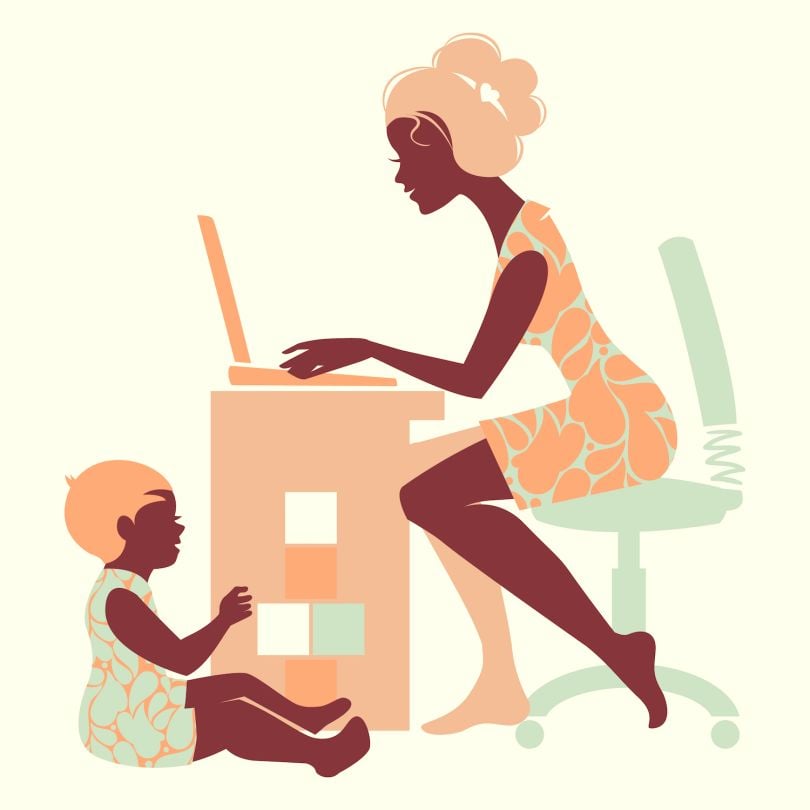My five-year-old son had just finished watching Aladdin as part of cinema class — the latest rebranding my wife and I had tried out to delude ourselves into thinking we could effectively homeschool our child while working full-time jobs.
Sarah is an assistant United States attorney, and, for the past seven weeks, she has been working on a fold-out table in our basement trying to manage her caseload. Meanwhile, I’ve been staked out in our upstairs bedroom writing dispatches like this one while fielding Zoom calls and keeping up with Slack channels. We’re blessed to have a nanny with our son and two-year-old daughter most of the week, but, like many parents, we are trying, quite simply, to stay afloat.
We’re blessed to have a nanny with our son and two-year-old daughter most of the week, but, like many parents, we are trying, quite simply, to stay afloat.
There are countless apps and remote learning tools available to us. We have a stable Wi-Fi connection, a working printer and the gift of an amazing, pink-haired, 59-year-old Chicago Public School teacher, who has created an entire remote learning website for my son’s kindergarten class. The portal has links to morning meditations, pre-recorded videos of her doing phonetics lessons, and science activities guided by hilarious YouTube videos.
Suffice to say, we are deeply privileged, and in a much different position than the families on the other side of the digital divide for whom the district is “distributing 65,000 school-based Chromebooks, laptops and iPads” and, in total, “more than 100,000 devices to families in the weeks ahead,” according to a recent email from CPS.

Our Children Are Going Stir Crazy Too
Still, it has been an incomparably challenging time, mainly because our children, like us, are separated from their friends, family and social mainstays. They can’t play on playgrounds. They can’t get pancakes at McDonald's. We tell them to stay six feet away from their friends. On my Instagram feed, I read reports of children dreaming of the virus, drawing pictures of it, and giving it imaginary names like “Virusy” in pretend play.
After watching Aladdin, my son said his three wishes were that he could always be five years old, that the virus would end and that his two-year old sister would stop screaming and crying. That day, we finished school early and took a walk around our block in Bucktown, where families have put stuffed animals in their windows as part of a “walking safari” for kids. The peacock, we learned peering at one window display, is native to India and a symbol of ancient royalty.
I’m not sure how much of that will stick with a five-year-old, but it saw us through a difficult day.

The ‘Schooling’ Part Is Not the Main Problem With Home Schooling
The most pervasive unfounded assumption about parents working from home, among those not living through the experience, is they are consumed by worries their children will fall behind academically. My inbox is flooded with ideas for schedules, activities and online learning tools. And while there are innumerable apps and programs available to parents to engage children, trying to fit them into a workday is not easy, as Ann Royals’ McSweeney’s parody, “Emails From My Children’s School Before 8:00 AM During the COVID 19 Crisis” brilliantly captures.
In contrast to the newly monastic existence of those living alone, most parents I’ve chatted with on social media don’t feel socially isolated at all. Far from it: they are around their children and spouses nearly 24 hours a day. Rather, what they feel is a sense of cognitive dislocation in a world in which the traditional boundaries of work and home life, already tenuous, have been completely dismantled.
Most parents I’ve chatted with on social media don’t feel socially isolated at all.
In her blog, psychotherapist Esther Perel, author of Mating in Captivity, compares what we’re living through to other periods of psychic calamity, such as World War II and 9/11, writing that “activating the collective healing capabilities of our communities — by sharing stories and accurate information, helping each other, and lifting one anothers’ spirits — is the most powerful antidote to fear, loneliness, and isolation.”
To that end, the most valuable employer support I’ve received thus far has little to do with educational resources and more to do with empathy, whether that’s a thoughtful manager asking about my weekend, an openness to more flexible scheduling, or a social lunch call that has little to do with work or kids.
Maybe I’m on Google Meet with my team talking about the TV shows we’ve been streaming during the coronavirus pandemic. Maybe we’re on a Slack channel geeking out on oddball topics like broccoli, Fortnite or RSS feeds. Maybe I’m rooting for Aretha Franklin in an NCAA-style office bracket on women pop singers. This is the kind of levity I suspect many parents crave right now.
From a people management standpoint, the potential implications of supporting parents working from home — for recruitment, retention, productivity and employee well-being — are huge. With 43 states extending statewide school closures through the rest of the school year and Upwork’s Future Workforce Report predicting 73 percent of all teams will have remote workers by 2028, the evolving needs and expectations of working parents will be extremely important for tech leaders to have in their sights.
To get a sense of how others are managing the new realities of working from home, I reached out to parents at tech companies around the country. Here’s what they had to say.

Jordan Diggs, Recruiting Manager, Beyond Limits
Tell me about your experience working from home with kids.
It definitely has been a change because we are fully virtual for all of our candidate interviews. Being a recruiting manager, I’m interviewing people six times a day. Some of that stuff is difficult because my child is three. He’s not quite at an age that he can understand daddy’s working, I’m on the phone. If he has to go to the potty, I have to help him. So I can be on a call, and he runs in screaming “potty.” So I try to schedule things around nap time or when he’s eating, because I know if he’s eating he won’t get up to leave the table.
I jokingly tell job candidates that I have a three-year-old assistant. Putting it that way disarms people. It makes candidates who have children feel better. When their child appears in the background on the screen, it’s, like, “No I get it completely.” I can see candidates relieved a little bit when they know my child may jump in if theirs does.
What is Beyond Limits doing to help employees working from home with children?
We had a couple of conversations, and our human resources business partner recommended opening scheduling flexibility to managers, who are able to work with parents to set hours at their discretion. We have one data scientist, specifically, who doesn’t work from 1 p.m. to 5 p.m. He takes that time off, but then he gets back online from 5 p.m. to 9 p.m. to recover that time.
“It’s a very understanding environment, which, I think, has been really important for us to be able to make it work and not have a loss in productivity or even a sense of embarrassment.”
Outside of that, we’ve had a lot of understanding from leadership at our company. The other day, when my son jumped in my lap, my director immediately picked up his cat and started talking to my child about the cat. It’s a very understanding environment, which, I think, has been really important for us to be able to make it work and not have a loss in productivity or even a sense of embarrassment. Because that’s where some of the stress would come. I appreciate that.
What can other companies do to make parents’ lives easier?
There’s quite a bit recruiting managers can do during this time. Some people with children are wondering about insurance plan differentiation. The conversations we’re having aren’t centered around compensation anymore. It’s insurance coverage: how quickly is it available? Because parents are afraid, if they start on X date and their child or husband or whomever gets sick before they’re covered, what will happen? I’m also getting questions about how we are handling onboarding: remote calls, remote interviews, starting remotely and what’s the need for being in the office. So you could see how the selling points look different.

Alyssa Zarouk, Head of Growth and Marketing, Tapcart
Tell me about your experience working from home with kids.
I’m in a really unique position. Tapcart is a B2B SaaS platform that helps Shopify merchants build native mobile apps for their stores. We started in 2017, and right now we have about 35 people. At the moment, I’m the only parent in our office. It’s challenging when you’re in that boat alone — especially when your home life and work life get pushed together instantaneously and nobody can really relate.
We’re very fortunate that my nanny is still helping and still working. It’s been an adjustment, but now we have a schedule and a routine down and he’s no longer participating in my video calls with the team.
What is TapCart doing to help parents working from home?
The thing I appreciate most about my coworkers is, even though no one really understands the juggle that I’m going through right now, several of them have reached out and just been super nice and said: “You know, how are things going over there? How is Asher doing?”
What can other tech companies do for parents working from home?
What companies can really do to support working parents is allow them to structure their days in a way that makes the most sense for what they’re dealing with at home. Let’s say you’re in a two-parent household and both parents are working from home. You could set five hours that you’re going to be available for meetings and work during this portion of the day, and then three, four or five hours later in the day where you have childcare or a significant other who might be able to help.
“What companies can really do to support working parents is allow them to structure their days in a way that makes the most sense for what they’re dealing with at home.”
I think it’s also a two-way street. The employer needs to allow for that flexibility, especially during these times. But I think it’s also really important for the employees themselves to also request it and to raise their hands and say: “Hey, I’m struggling. I need to set some different work hours.”

Colleen Curtis, Head of Community and Communications, The Mom Project
Tell me about your experience working from home with kids.
We’ve been pushing for companies to adopt remote work since our inception, because we know that it better serves the needs of working parents generally. Now, all of a sudden everyone went remote, but this is not the great working-from-home experiment we imagined. It’s working from home with kids. This is a whole other thing.
What is The Mom Project doing to support parents working from home?
We worked up a framework for parents working from home with kids. It focuses on the three Cs: communication, collaboration and culture. When we acquired WerkLabs, we absorbed their Remote Experience Index Model. Great timing, because then everyone went remote. It’s a customized model to identify the strongest drivers for productivity and employee sentiment, and to increase the sentiment index for remote workers.
“This is not the great working from home experiment we imagined. It’s working from home with kids. This is a whole other thing.”
We took that and said, “OK, can we create a really quick guide for parents on how to approach this?” Because no one’s an expert at working from home with their kids at this large of a scale. Particularly with the added stress of a global pandemic.
What can other tech companies do for parents?
There needs to be a lot of flexibility, a lot of grace. Also, as managers, we have to fundamentally shift to try to make our work as asynchronous as possible. So not forcing this rigid meeting schedule throughout the day when possible.
Another recommendation we made for our mom community was for individuals to host educational sessions for kids on topics like drawing. No one expects anything to be highly produced. I think that’s what’s been so interesting about this time. Because everyone’s had to adapt so quickly, it’s negated the need for everything to be perfect. People are finding there’s a lot of joy in the imperfections of learning a new thing, and everyone’s learning together, including our kids.

Toby Hervey, CEO and Co-Founder, Bravely
How can companies be more understanding of parents working from home with children?
This is something my co-founder, Sarah Sheehan, and I talk a lot about. She has a four-month-old at home and a stepdaughter, and she’s navigating all this. Half the time she’s working from home, she has her baby on her lap because there’s nowhere else for the child to go.
We provide phone-based coaching sessions for employees with vetted, certified professionals. Lots of people we work with are parents. They’re struggling for space, and that’s stressful. How are you going to have that conversation with your coworker who’s actually your spouse about how you stagger call times and how you set up your schedules? Resilience is a big theme. Everything we’re hearing from our coaches follows from that: “How do you stay resilient? How do you stay strong? How do you approach each day with a fresh mindset?”




